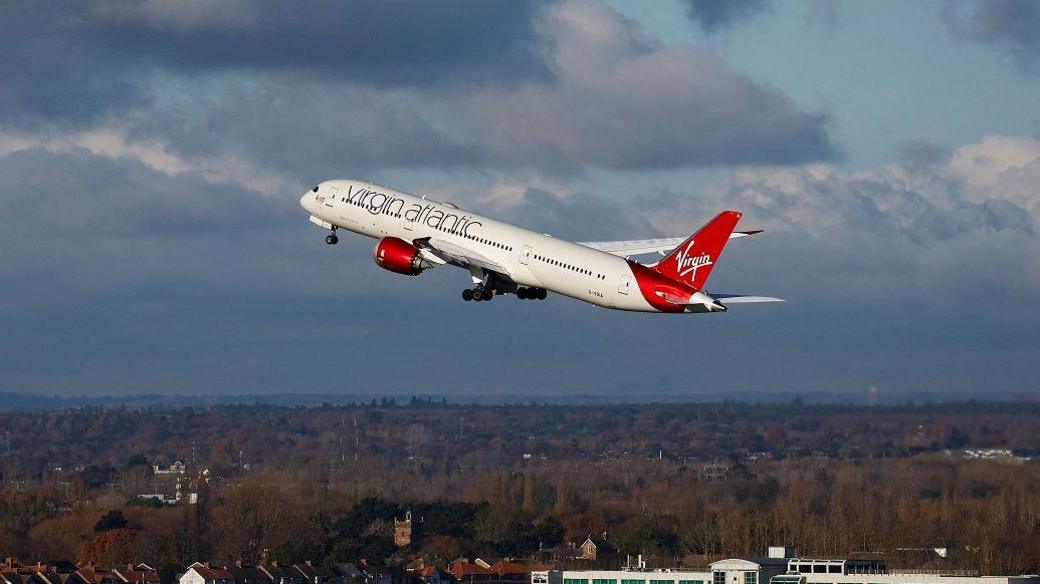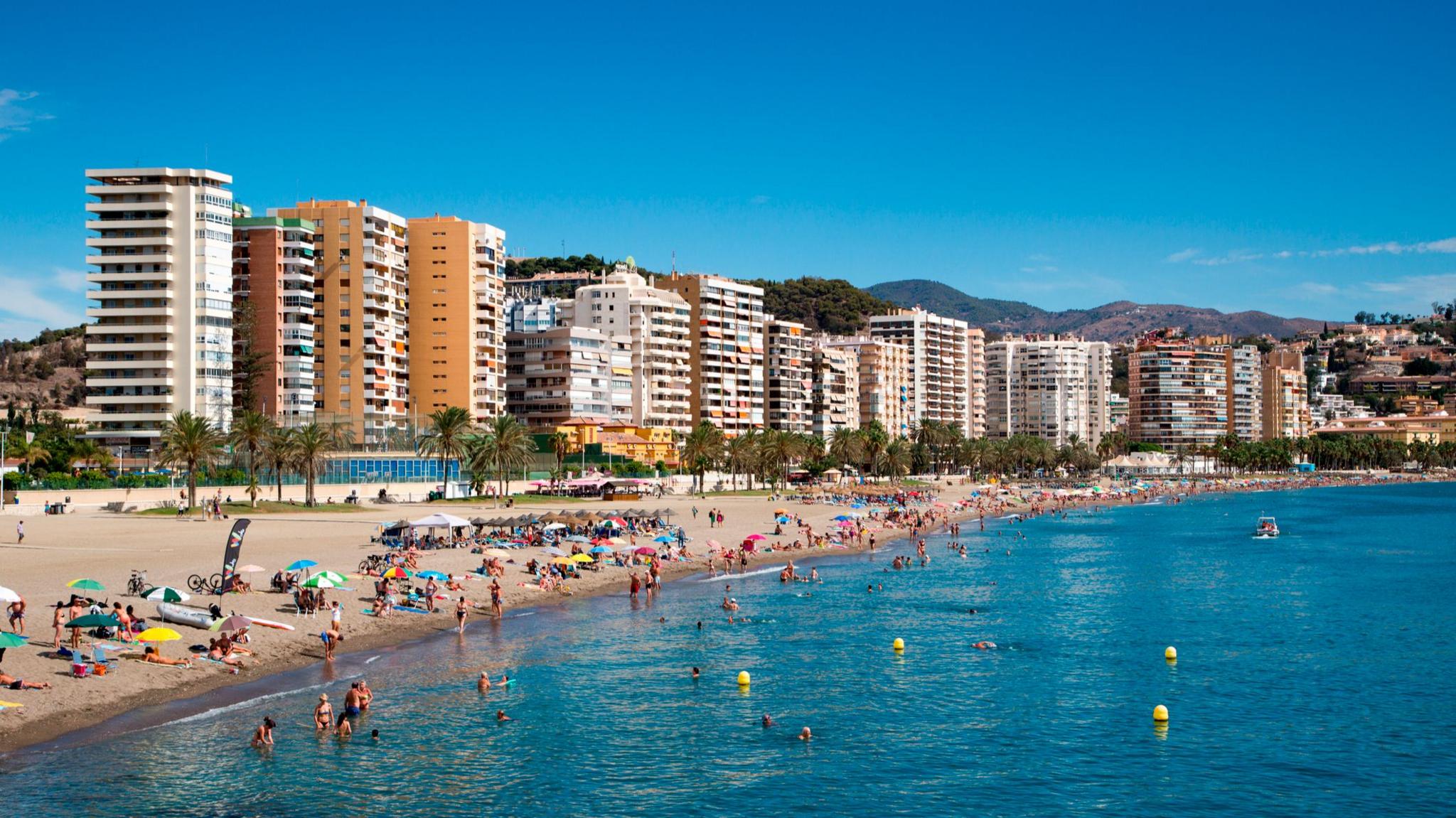Why travellers are flying abroad – for day trips

Justine Tipling's first "extreme day trip" was to Copenhagen in Denmark
- Published
The "massively expensive" public transport options in the UK and the state of the country's roads are prompting thousands to go on "extreme day trips" – flying to another country and back in one day. But environmental charities warn that flying is the most carbon-intensive way to travel.
Since discovering "extreme day trips" in December 2024, Justine Tipling has been on nine trips to cities including Copenhagen, Malmö and Krakow.
She decided that taking day trips abroad would be a better use of her money and a more efficient way of exploring the world.
"I thought, I live in Bristol... why am I not doing this?" Ms Tipling said.
"It was just a case of get out and see the world and do something that's a bit more interesting."
The travel trend involves flying out first thing in the morning and exploring a new place for several hours before flying home in the evening on the same day.
Ms Tipling's interest was piqued after seeing a Facebook group for travellers taking extreme day trips from Bristol Airport, which has more than 96,000 members.

Ms Tipling said other extreme day trippers inspired her to visit places like Marrakesh in Morocco
Ms Tipling said the expense and inconvenience of UK travel prompted her to keep booking the trips abroad.
She said that public transport in the UK was "massively expensive".
"You can pay £150 for a ticket and you don't even get a seat on the train," she said.
She also prefers extreme day trips because of how fast the plane journeys are in comparison to driving to some parts of the UK.
Ms Tipling said it has taken her five hours to drive from Bristol to visit her parents in Paignton, Devon, with her time spent sitting in queues on the M5.
"I'd rather be parked up, sat in the airport lounge and then hopping on a plane for an hour-and-a-half, spend five, six, seven hours – whatever it is – looking at a new city, finding out a new place, trying different food and then back home without the hassle of sitting on the motorway," she said.

Chris Williams and his daughter spent a day in Majorca earlier this year
Chris Williams, who has been on three extreme day trips so far this year, said while people questioned his "chaotic" choice to fly to Majorca for the day with his daughter, he thought it was a "good idea".
"If I drive to Cornwall from here, that's like three-and-a-half hours, so I might as well just jump on a plane," he said.
"It'll be cheaper and you're guaranteed the weather. It's a bit of a buzz and it's exciting."
The 34-year-old, who lives in Cwmbran, Wales, chooses to fly from Bristol for what he says are "better and cheaper" flights compared with those from Cardiff.
His other two trips were to Dublin.
"It's something different and out of the ordinary," he said. "We only live once and it's a big world to explore."
Like Ms Tipling, Mr Williams said that much of his reasoning boiled down to high public transport costs in the UK compared with the rest of Europe.
"You see a lot of these European countries doing public transport tickets… buses, trams, trains, sometimes all in one ticket," he said.
The Department for Transport declined to comment.

Mr Williams has been on two extreme day trips to Dublin
However, extreme day trips have drawn criticism over their environmental impact.
Flying is responsible for 2.4% of global greenhouse gas emissions and 8% of UK emissions.
These gases warm the atmosphere, contributing to global warming and climate change.
Both Ms Tipling and Mr Williams acknowledge this, but argued that the planes will fly, whether people are travelling for a day or for a week.
A spokesperson for the Aviation Environment Federation campaign organisation said: "Frequent day trips by air are a surefire way of rapidly using up our remaining carbon budget.
"Flying is the most carbon-intensive way to travel, and is predicted to be the biggest source of UK emissions by 2040, according to the Government's climate advisers."

In November 2023, Virgin Atlantic powered a transatlantic flight using 100% alternative fuels but a lack of fuel supply remains a challenge
In November 2023, the first transatlantic flight by a large passenger plane powered only by alternative fuels landed in the US.
But the use of alternative fuels for planes is in its infancy and "will not scale significantly until the mid-2030s at the earliest", the Aviation Environment Federation spokesperson said.
"Until they do, we need to be thinking carefully about how we use today's largely fossil-fuelled aircraft."
The federation said that a passenger taking a return economy trip from Bristol Airport to Madrid would add nearly one quarter of a tonne of CO2 emissions to their carbon footprint – the same amount of carbon as the average petrol car emits in two months.
"You would need to travel more than 6,000km by rail in the UK before you emitted that amount of carbon, and even further using international rail services," the spokesperson said.
Facebook groups where people share their experiences of taking extreme day trips are often focused on specific UK airports.
A spokesperson for Bristol Airport said "very few" of their customers embarked on extreme day trips.
"Bristol Airport does not support or have any involvement with these groups," they added.
For now, Mr Williams and Ms Tipling say they will be continuing to book while the UK's public transport costs remain high.
Get in touch
Tell us which stories we should cover in Bristol
Follow BBC Bristol on Facebook, external, X, external and Instagram, external. Send your story ideas to us on email or via WhatsApp on 0800 313 4630.
- Published22 March

- Published29 November 2024

- Published29 January

- Published20 September 2024
